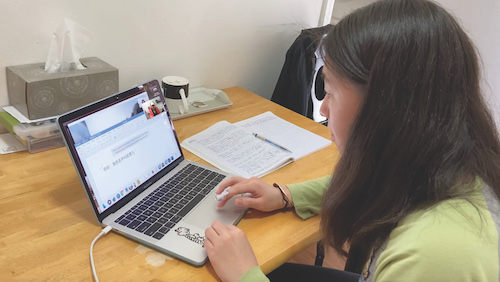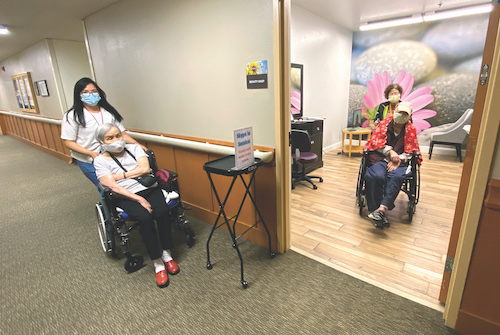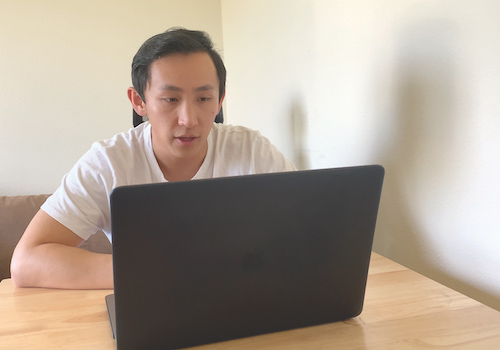By Debbie Williams and Dan Guo
Nursing homes across the country are taking extra precautions during the COVID-19 pandemic. ACC Care Center is no different, implementing mandatory face masks for staff members, temperature screenings, limited group social activities, restricted visitations, and cancellations of in-person volunteer programs. ACC Care Center residents are, without a doubt, physically safer because of these measures. However, it is just as important to ensure ACC Care Center residents experience a healthy and supportive social community.
Social Undistancing
ACC Care Center has partnered with volunteers from Stanford University in an initiative called Virtual Park Bench. From the early weeks of the pandemic, Virtual Park Bench has organized 1-1 video calls between Stanford students and nursing homes in Sacramento, Santa Rosa, San Jose, and Fremont.
Volunteers Teresia Chen and Jonathan Mak host weekly conversations in Mandarin and Cantonese for residents of ACC Care Center.One of these residents is Ms. Guangzhen Lin, originally from China. Each Tuesday, Ms. Lin speaks in Mandarin with Teresia, a pre-med student. In their most recent session, Ms. Lin and Teresia connected on a variety of topics.

“The pandemic has grown beyond what anyone expected,” Ms. Lin said in Mandarin. Ms. Lin confided with Teresia about her concerns of the pandemic that started in her home country, but was also reminded of her fondest memories growing up in China. Almost instinctively, Ms. Lin began singing a few lines from a song from her childhood. After thirty minutes of stories, singing, and the occasional thoughtful silence, Ms. Lin was caught by surprise when time was up. “You better be back next week!” Ms. Lin says playfully to Teresia.
From the start of the pandemic, the gregarious Ms. Lin had grown increasingly lonesome. Even though Ms. Lin had frequent phone and Skype calls with her family, she yearned for additional and varied social interactions. Virtual video calls have allowed Ms. Lin to experience this. “Although I cannot read Ms. Lin’s mind, I’ve noticed how uplifting these conversations are for her: smiles, laughs, reminiscing past history with shared interests and opinions,” says Teresia after her video call with Ms. Lin.

Similarly, ACC Care Center Activity Assistant Zyra Bonita noticed the positive impact of the video calls for another resident, Mr. Teh Ou. “It’s just great to see Mr. Teh Ou’s transformation. I remember before we started the video calls, Mr. Teh Ou was very reserved, and this was only worsened by the pandemic.He was skeptical and not fully engaged. I thanked the volunteer for having the patience to continue the conversation, but honestly I did not think Mr. Teh Ou had a good time. I was surprised when he asked when the next video call was. The simple act of having a 20-something year old check in on him has brought a new energy to him.” Mr. Teh Oh is more active and engaged during the days now.”
Not only are residents appreciative of the program, so are volunteers. “As someone who strives to work towards a career in medicine, since shadowing and in-hospital volunteering are all suspended, these alternative forms of care such as keeping senior residents company are wholesome experiences, that I can still contribute to the best of my ability,” says Teresia. She hopes that the opportunity will continue to heal these residents emotionally and psychologically and encourage other long-term care facilities to participate as well.

Volunteer Jonathan Mak says, “I’ve been able to converse with residents in their native language and address unmet needs for them that they may be hesitant to convey to others, since oftentimes English is not their primary language. We’re able to connect not only on a cultural level, but also share generations worth of knowledge with each other in a time where crisis dominates media talk and it can be very easy to feel isolated amidst the social distancing.”
Jonathan has also been hosting weekly video calls with Cantonese resident Ms. Oi Yeung. During these unprecedented times, Virtual Park Bench video calls have become a consistent part of the social life for participating residents. It is something that nursing home residents look forward to. Especially for residents who speak limited English, the video calls are refreshing outlets for residents to connect on a deeper level.
As far as plans after the pandemic subsides, Virtual Park Bench founder Dan Guo is excited to keep the program going. “By now, Ms. Lin, Mr. Teh Ou, and other residents have formed long-term, if not life-long, relationships with the volunteers. I’d love to see these relationships continue to blossom.”
(Debbie Williams is the Activity Director of ACC Care Center. Dan Guo is the founder of Virtual Park Bench. For more information, visit virtualparkbench.org.)

Add a Comment